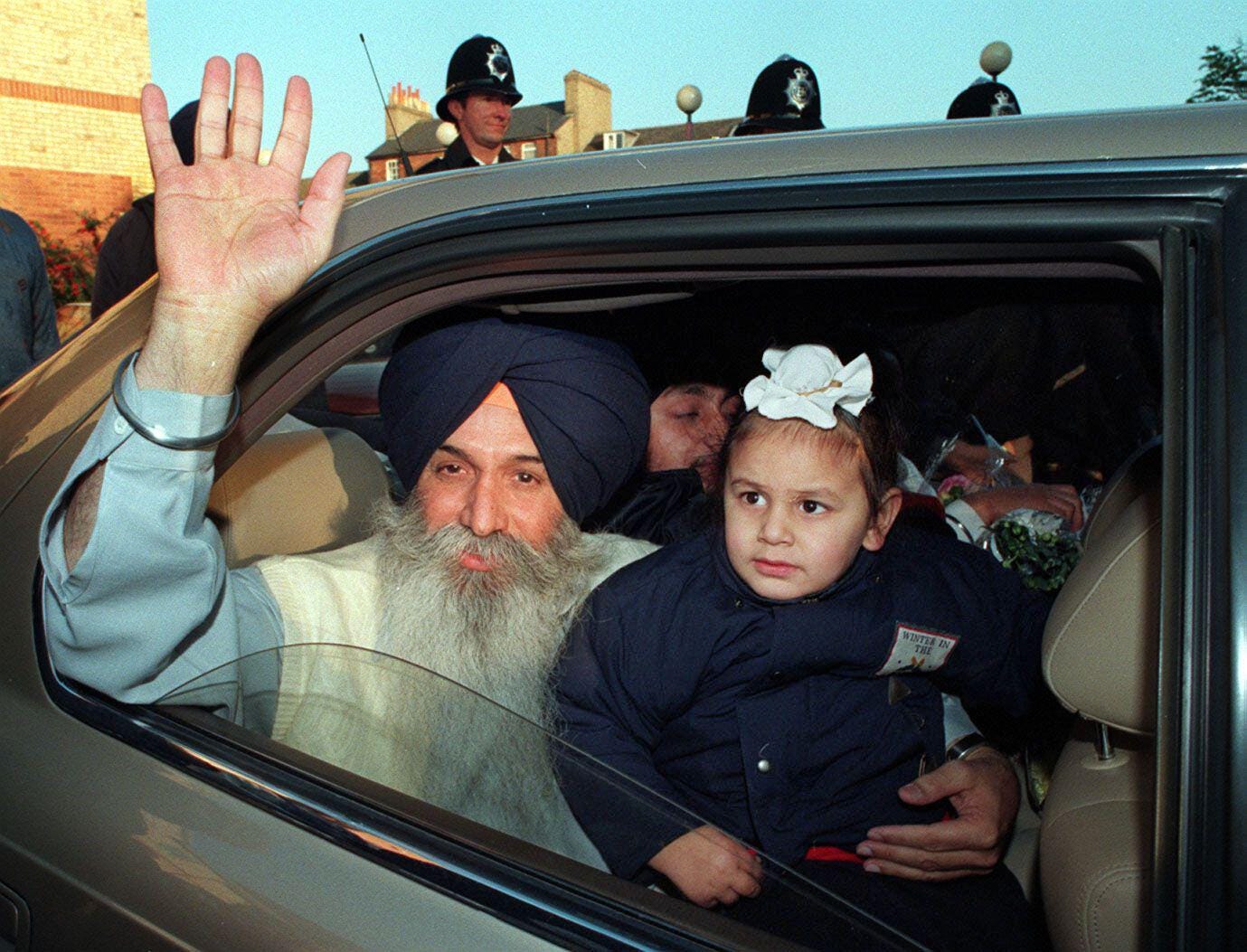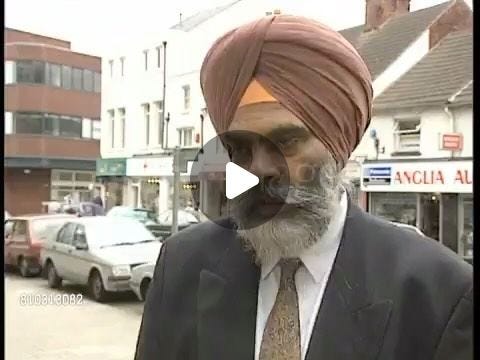Remembering Bhai Karamjit Singh Chahal, A Sikh British Political Prisoner
"Chahal’s six years of arbitrary political detention began in August 1990, with a view to deport him to India..."

Har-Rai Kaur
January 31, 2024 | 5 min. read | Obituary
Last month, many UK Sikhs honoured the life of a man who represents a British version of the Sikh political prisoner story.
Karamjit Singh Chahal passed away on December 15, 2023, after a long illness. His passing saw British Sikh organisations honour his legacy and his activism, which led to him serving a stretch in a UK prison during the 1990s without ever being convicted of a crime.
Chahal’s six years of arbitrary political detention began in August 1990, with a view to deport him to India, when the UK Conservative government Home Secretary, Douglas Hurd, questionably decided Chahal’s presence in the United Kingdom was “unconducive to the public good for reasons of national security and other reasons of a political nature, namely the international fight against terrorism.”
This UK government move came six years after Chahal first became truly involved in Sikh activism.
Chahal travelled to Punjab in early 1984 with his wife and children to see family. He visited Harmandir Sahib and came across Sant Jarnail Singh Bhindranwale on several occasions. Around this time, Chahal took Amrit and became involved in the Khalistan movement by “organising passive resistance” for the cause.
On March 30, 1984, just over a month before Operation Blue Star, Chahal was arrested by Punjab Police and detained for 21 days. It was common for Amritdhari Sikhs to be picked up and harassed by the police during that time in the lead up to the Sikh Genocide. He was kept hand-cuffed in unsanitary conditions, beaten to unconsciousness, electrocuted on various parts of his body, and subjected to a mock execution, after which he was released without charge.
Chahal returned to the UK in May 1984, and after the Indian invasion of the Darbar Sahib Complex in June 1984 he became active in organising demonstrations against the Indian government. He would eventually become a leading figure in the International Sikh Youth Federation (ISYF), and was never able to return to his homeland of Punjab again.
Chahal’s parents, as well as other relatives and friends, were detained, tortured, and questioned by the Punjab police in October 1989 about Chahal’s activities in the UK. Some also died in police custody, and two of his close relatives were shot by Indian security forces.
Yet, Chahal’s activism continued.
It was believed by Sikhs that the Indian state directed the UK to begin the process of deporting Chahal, in order to silence his organising efforts raising awareness in the West about Indian atrocities. These were well founded fears of collusion considering subsequent evidence of India connecting with the UK for advice on attacking Sikhs in 1984.
The 1971 Immigration Act meant that authorities were not required to give any specific reasons for their decision to deport, leaving Chahal, his family, and the rest of the Sikh community unable to effectively counter any inaccurate information that the authorities had on him, specifically any information surrounding the labelling of Chahal as a “national security” threat.
Since 1978, but particularly in the 1980s and 1990s, the Indian authorities have committed extensive human rights abuses against the Sikh community in Punjab, including disappearances and extrajudicial executions. This was all well-known internationally at the point of Chahal’s detention.
Five years into his imprisonment, Chahal was interviewed by The Independent. “I wanted to spread Bhindranwale’s message that Sikhs should return to the pure forms of their religion…I supported the idea of Khalistan - of independence for Sikhs,” he said.
Chahal challenged his deportation in court several times during his political detention.
“If there are allegations against me,” he told the Independent, “all I ask is to be brought before a court so that I can answer them. If I have done anything wrong, I will happily leave the country.”
One appeal ruled that Chahal’s case be re-examined, taking into account Amnesty International’s May 1991 report titled India: Human Rights Violations in Punjab, over concern for Chahal’s safety, whilst other appeals ruled that Chahal’s detention was not unlawful.
The Court of Appeal decided in 1993 that the Home Secretary was entitled to balance the risks to Britain of allowing Chahal to stay against the risks to Chahal if he were expelled.
By 1993, he was at imminent risk of being forcibly returned to India, where he would likely face torture, disappearance, and extrajudicial execution. Amnesty International feared this quite possible outcome and urged the UK Government not to deport him, reminding them of their obligation under international law not to forcibly return anyone to a country where they would be at risk of serious human rights violations. They called on British authorities to release Chahal if they did not have anything to charge him with. Members of the British Sikh community also campaigned for his release by lobbying their members of parliament and raising awareness for Chahal’s case.
On November 1, 1993, an Early Day Motion with 35 supporting MPs was also tabled in the UK Parliament calling on the UK Government to release Chahal.
“That this House protests at the imprisonment in Bedford since 16th August 1990 of Mr Karamjit Singh Chahal; notes that Mr Chahal has been convicted of no offence within the United Kingdom; believes his removal to India would represent a travesty of natural justice and would place Mr Chahal at grave risk of persecution, torture and extra judicial murder; and urges the Home Secretary to release Mr Chahal from prison so he can be reunited in Britain with his wife and two British-born children,” it read.
Finally, Chahal challenged the UK Government at the European Court of Human Rights (ECHR) in Strasbourg, arguing in part that deporting him to India would mean that they would breached Article 3 of the Human Rights Convention - “No one shall be subjected to torture or to inhuman or degrading treatment.”
In a landmark ruling in November 1996, the ECHR ordered Chahal’s release.
The European Court of Human Rights found that the UK Government’s attempt to deport Chahal was in violation of the European Convention for the Protection of Human Rights and Fundamental Freedoms.
A momentous moment for Chahal, and a major historical event for Sikh activism in the diaspora.
Sikhs have always known that they are targets for transnational repression, something that has gained global attention over the past few years. They also have known that collusion between India and western governments, in particular the UK government, is a legitimate concern.
The importance of Chahal’s story is how it reflects those realities. It was a case in which the human rights of a British citizen were put aside for UK pandering towards India.
We are witnessing a similar story play out today in the disturbing case of Jagtar (Jaggi) Singh Johal, where for over six years now, the UK Government has yet again put diplomatic relations and a possible trade deal with India above the human rights of a British citizen who is being arbitrarily detained in India without any prospects of conviction.
In the end, there was no evidence that Chahal had committed any crimes in the UK, or even India for that matter, and yet his human rights were cast aside over vague and unclear “national security” concerns.
His support for Khalistan, in the face of the Sikh Genocide, was enough to justify his unfair treatment in the eyes of UK decision makers. A grim reality as our fight against Indian oppression and tyranny continues. Yet Chahal’s life exemplified that Sikh spirit of Chardi Kala, and facing adversity with an optimism that challenges darkness in all its forms.
An example worth celebrating and remembering.
Har-Rai Kaur is currently the Junior Press Officer for the Sikh Press Association. She is a graduate in Political Philosophy interested in expanding and implementing de-colonised political thought in line with Sikh philosophy.
Baaz is home to opinions, ideas, and original reporting for the Sikh and Punjabi diaspora. Support us by subscribing. Find us on Twitter, Instagram, Threads, Facebook, and TikTok at @BaazNewsOrg. If you would like to submit a written piece for consideration, please email us at editor@baaznews.org.


